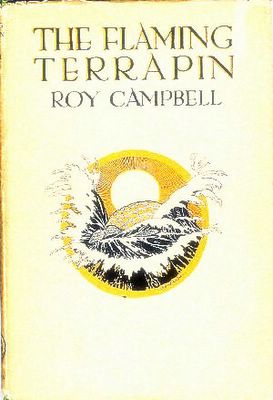

How often have I lost this fervent mood,
And gone down dingy thoroughfares to brood
On evils like my own from day to day:
"Life is a dusty corridor," I say,
"Shut at both ends." But far across the plain,
Old Ocean growls and tosses his grey mane,
Pawing the rocks in all his old unrest
Or lifting lazily on some white crest
His pale foam-feathers for the moon to burn -
Then to my veins I feel new sap return,
Strength tightens up my sinews long grown dull,
And in the old charred crater of the skull
Light strikes the slow somnambulistic mind
And sweeps her forth to ride the rushing wind,
And stamping on the hill-tops high in air,
To shake the golden bonfire of her hair.
This sudden strength that catches up men's souls
And rears them up like giants in the sky,
Giving them fins where the dark ocean rolls,
And wings of eagles when the whirlwinds fly,
Stand visible to me in its true self
(No spiritual essence or wing'd elf
Like Ariel on the empty winds to spin).
I see him as a mighty Terrapin,
Rafting whole islands on his stormy back,
Built of strong metals molten from the black
Roots of the inmost earth....
A friend of mine sent this poem as a reference to the dream I had.
I think the similarities are potent, and I love Roy Campbell.
Has anyone read Unafraid of Virginia Woolf: The Friends and Enemies of Roy Campbell by Joseph Pearce. From the book's back cover:
Acknowledged as one of the finest poets of his generation after the publication of his long poem The Flaming Terrapin, Campbell came to prominence in the 1920s when he captured the imagination of the English intelligentsia with his romantic background and controversial style.
Pearce’s vivid biography centers on Campbell’s ongoing feud with the Bloomsbury group and the ideas they championed, the friendships Campbell forged with figures such as C. S. Lewis, T. S. Eliot, and the Sitwells, and Roy and his wife Mary’s reception into the Catholic Church.
Campbell’s literary relationships and wonderfully romantic life is, thus, the context for this riveting account of Campbell’s reckless life and the fascinating poetry that was left behind. That poetry, in the judgment of Pearce, was "both perplexing and challenging—yet no more so than the poet himself." Both Roy Campbell the man and his poetry richly deserve the engrossing reappraisal offered here by acclaimed biographer Joseph Pearce.
No comments:
Post a Comment